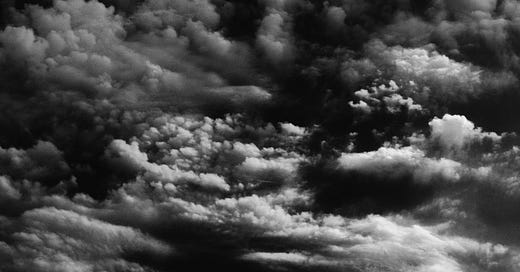Like Snow in November
Brief reflections on the beauty of transience, Kafka, and art kept secret
Stove-boiled masala chai, a (modestly) clean and cardamom-scented house, a historical fantasy novel, and a warm crochet project from a woodsy wool skein. I sit curled up in my corner of the couch, cheek to jowl with a wallful of books. Rain drips from the eaves and the fridge emits an angelic “ah” from the kitchen.
Cars whoosh down the waterlined street reflecting silver on the surface of the blacktop. The seasonal ice cream stand shut down two months ago, and no crowds gather in the parking lot to enjoy a taste of “Sweet Cream” or “Butter Toffee” or “Hot Fudge Sundae.” Passerby hurry down the sidewalk with their chins tucked into their coat collars, sticking to the left side to avoid the splashing from cars. A child is wandering in his yellow rainsuit with his face turned to the sky like a sunny-side up egg. He is still there when I turn into my alley.
As the light fades, a chill seizes the air, the last raindrops fall, and the world waits in silence as the sky fills with fragments white and soft as ash. When the snowflakes hit the wet blacktop, they vanish like little magicians, and we wonder whether they were ever there at all.
The sky is black, and the November snow is falling. The November snow is falling as slowly as it can, and then it disappears like a year, a decade, a lifespan, a century.
The cardamom scent no longer fills my house. My crochet project is finished, and the skein of woodsy yarn is gone. The child has gone home. For dinner, I eat an air-fried hotdog, puffed and blackened as if it were roasted over an open flame. My kitchen smells like burning.
I remember Kafka, as he fed his manuscripts into his cast iron stove, bit by bit, so as not to quench the fire. It took time to burn that much paper, and he did not have enough. In his will, he ordered his friend to finish off the job. But the friend betrayed his dying wish, and that’s why we read Kafka.
Ink brings some permanence. Like I said, it takes a while to burn a book. And if there are lots of copies, even longer.
Think before you write. Do you want this to last? If you want your words to perish, burn them yourself. Otherwise, you might end up like Kafka, sending story after story into life after life, continuing to change the future with the past long after you are dead.
Remember, you don’t get to choose which writings people read. So be selective.
Remember, there’s much that would pass quietly into dust. What is worth preserving?
Remember, each time you set your pen to paper, you magnify something, burnishing a halo of gold glory ‘round its head.
Lastly, and most importantly, don’t trust your friends with your unpublished works. They won’t burn it because it’s all that’s left of you.
There is nothing more human than the desire to hold onto moments as they slip through our fingers. They are sweet and each is to be treasured, but they spoil if you keep them in the dark. They are flowers that bloom and fade and wither to nothing, and their beauty is in their transience. To be set in stone, they must first be killed, and it is a sin to kill them and the sight of their sad corpses is painful. Don't crush the blossoms in your hand. Hold your fingers open. Let the wind take each petal away like ashes from a dying flame, like snow in November.
I don’t like being sappy, but I do appreciate you. It’s so much more fun writing in a community than all alone. If you enjoy my writing and would like to give me something for Christmas, please type up a brief comment or share this essay with a likeminded friend.






I have nearly forsaken the written word.
How could I kill a moment, embalm it, and display it? How could I treasure such a corpse?
And yet I enjoy the very writing to which I reply.... Perhaps that makes me a hypocrite...
Amelia. This is SO good. I could quote half of this post and everyone would think I'm an absolute poetic genius. I LOVED it and I bet lots of the people who read this post do too. From the first sentence to the last word, my interest was held captive and it still is now. Wonderful!